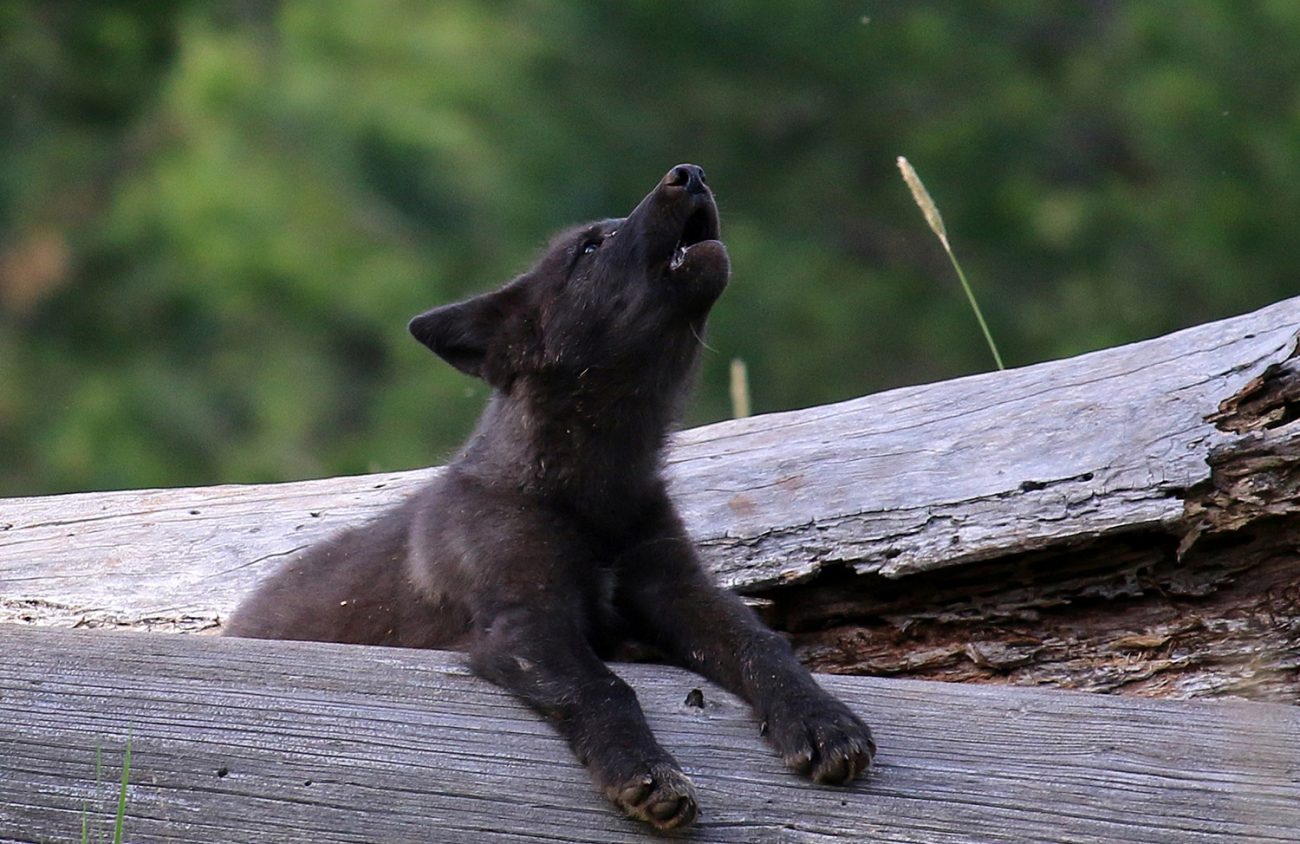The Aug. 3 announcement by the Oregon Department of Fish and Wildlife that it plans to kill two wolves from the Harl Butte Pack in Wallowa County on Oregon’s east side elicited howls of anger and dismay from wolf advocates as well as complaints from ranchers who wanted to see the entire pack wiped out.
Meanwhile in the lawsuit over the state’s decision to strip wolves of their endangered species status, local conservation group Cascadia Wildlands chalked up a win when the court ruled that the Oregon Cattlemen’s Association and Oregon Farm Bureau could not amend their legal brief to add the argument that wolves are an invasive, rather than endangered, species.
According to ODFW, the Oregon minimum known wolf population in 2016 was 112 wolves. Wolves existed in Oregon until they were extirpated (locally wiped out) in the early 1900s.
Gray wolves were on the state endangered species list until late 2015, when the Fish and Wildlife Commission voted to delist them. In 2016 the Oregon Legislature passed House Bill 4040, blocking judicial review of wolf delisting, and Gov. Kate Brown controversially signed the bill into law. Cascadia Wildlands was one of three nonprofits to file a lawsuit against the delisting.
HB 4040 also resulted in the dismissal of the lawsuit, but it was reinstated in July 2016.
According to Nick Cady, the legal director for Cascadia Wildlands, the delisting had more than 10,000 public comments in favor of keeping wolves on Oregon’s endangered species list. Cady says the state has “pretty good laws” when it comes to wolves but that the ODFW commission did not use the best available science or peer reviewed research in making its decision.
Cascadia Wildlands filed an ethics complaint against three lawmakers, State Reps. Sal Esquivel, Greg Barreto and Brad Witt, who initially told fellow House members that HB 4040 would not impact any lawsuits or requests for review. The complaint, which was dismissed without review in July 2016, was based on a state ethics law that says lobbyists and public officials can’t knowingly making false or misleading statements to other public officials. However, lawmakers don’t fall under the ethics commission’s jurisdiction because they can only be held accountable by other lawmakers. “Legislators can lie to pass bill,” Cady tells EW. He says Barreto then filed a bar complaint against him for filing the ethics complains, which was dismissed as frivolous.
On Aug. 2, the Oregon Court of Appeals denied the Oregon Cattlemen’s Association’s motion to amend its lawsuit and argument that “the species of gray wolf being protected under current law is not actually eligible for protection because it is not an indigenous species, but rather, in effect, an invasive species.” The OCA relied on information that was not in the agency record to make that argument.
In the motion it sought to replace that citation with a book and study, which the group says ODFW did look at. But the appellate court ruled that ODFW did not consider the book or a study in making its delisting decision and threw the motion out.
Asked if the argument that wolves were invasive opens the door to the idea that cows are invasive, Jerome Rosa of the OCA says, “Cattle are not an invasive species, and that’s the most bogus thing I ever heard.”
Rosa says cattle are not invasive because “they are managed.”
Rosa says the OCA would like to see the entire Harl Butte wolf pack killed or, in ODFW terms, lethally taken. “Calves are being decimated; wolves will do this just for sport,” he says.
The state’s Wolf Management and Conservation Plan allows for killing wolves as a way to deal with livestock depredation. But rather than wipe out the whole pack, “we will use incremental removal to give the remaining wolves the opportunity to change their behavior or move out of the area,” Roblyn Brown, ODFW acting wolf coordinator, says in a press release.
The Harl Butte pack hunts on both public and private lands.
Those wanting to know more on the wolf-cattle debate can check out Predator Defense’s new documentary The Profanity Peak Pack: Set Up & Sold Out on its website predatordefense.org. Predator Defense is a national nonprofit founded in Eugene.
And at 7 pm Friday, Aug. 11, at the University of Oregon’s Museum of Natural and Cultural History there will be a celebration of the new Wolves and Wild Lands exhibit, which includes food, beer tastings and an outdoor movie about Oregon wolf OR-7. “The exhibit and opening event are designed to encourage dialogue about wolf conservation in Oregon,” Ann Craig, the museum’s exhibitions director, says in a press release.
The MNCH is at 1680 East 15th Avenue, and the exhibit runs through February 2018. More at natural-history.uoregon.edu.
A Note From the Publisher

Dear Readers,
The last two years have been some of the hardest in Eugene Weekly’s 43 years. There were moments when keeping the paper alive felt uncertain. And yet, here we are — still publishing, still investigating, still showing up every week.
That’s because of you!
Not just because of financial support (though that matters enormously), but because of the emails, notes, conversations, encouragement and ideas you shared along the way. You reminded us why this paper exists and who it’s for.
Listening to readers has always been at the heart of Eugene Weekly. This year, that meant launching our popular weekly Activist Alert column, after many of you told us there was no single, reliable place to find information about rallies, meetings and ways to get involved. You asked. We responded.
We’ve also continued to deepen the coverage that sets Eugene Weekly apart, including our in-depth reporting on local real estate development through Bricks & Mortar — digging into what’s being built, who’s behind it and how those decisions shape our community.
And, of course, we’ve continued to bring you the stories and features many of you depend on: investigations and local government reporting, arts and culture coverage, sudoku and crossword puzzles, Savage Love, and our extensive community events calendar. We feature award-winning stories by University of Oregon student reporters getting real world journalism experience. All free. In print and online.
None of this happens by accident. It happens because readers step up and say: this matters.
As we head into a new year, please consider supporting Eugene Weekly if you’re able. Every dollar helps keep us digging, questioning, celebrating — and yes, occasionally annoying exactly the right people. We consider that a public service.
Thank you for standing with us!

Publisher
Eugene Weekly
P.S. If you’d like to talk about supporting EW, I’d love to hear from you!
jody@eugeneweekly.com
(541) 484-0519
